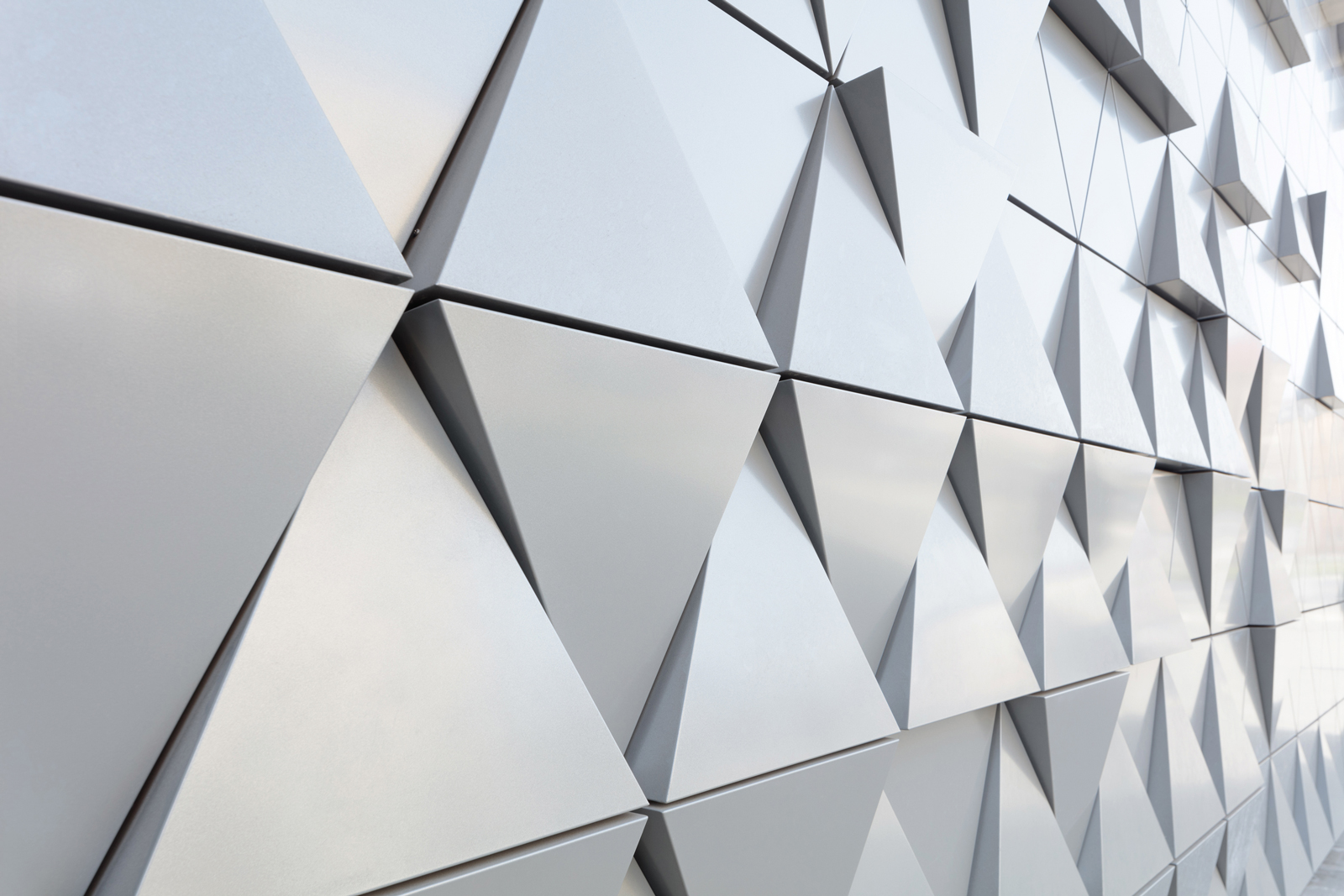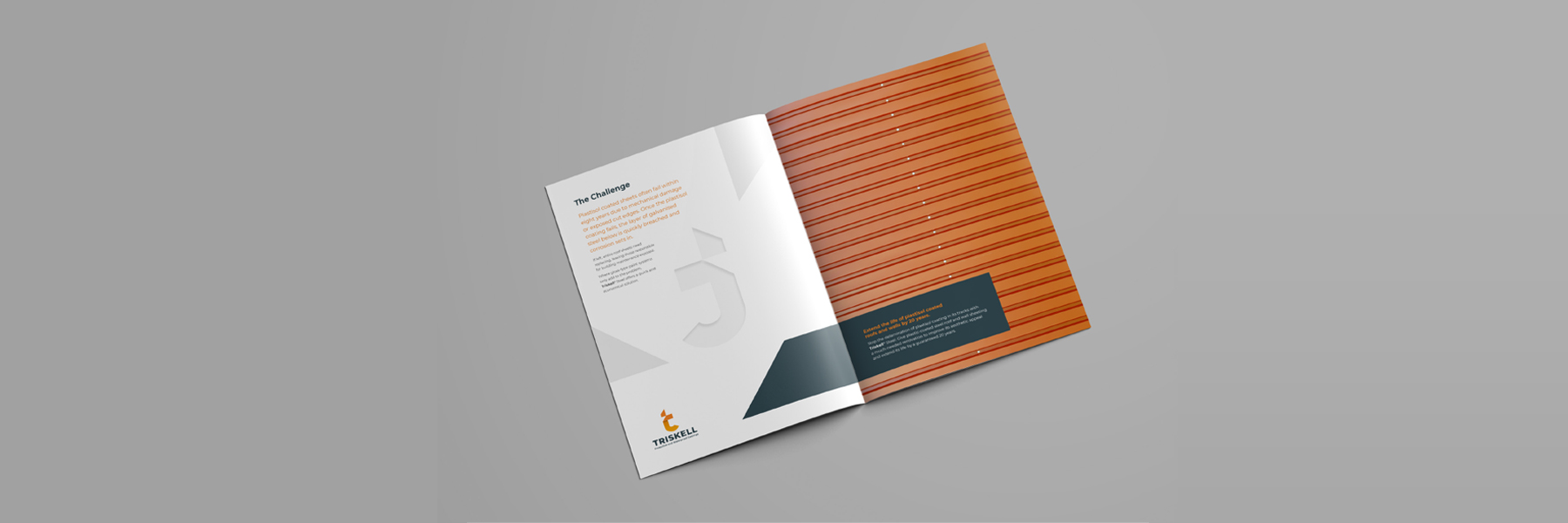Triskell® Steel
Plastisol coated sheets, which have gained popularity over the last 25 years, have been known to suffer from both tail end and general corrosion caused by mechanic damage, in as little as eight years from the date of installation.
The premature failure of these sheets is becoming an increasingly common problem for building owners, maintenance specifiers and building occupants who under the terms of the lease have a duty to maintain the building in good order.
The delamation of the plastisol coating is not only unsightly but leaves the microscopic layer o! galvanised coating un-protected. Once the galvanised coating is breached, corrosion will quickly follow, which could lead to costly bespoke manufacturing of replacement sheets.
All too frequently, attempts to overcome this problem using unsuitable alkyd gloss type paint systems meet with failure, resulting in continuing unsightly cladding finishes and a high cost to ratify the mistalke. Chemplas Triskell®, who pioneered the renovation of asbestos cement roofs over 30 years ago l1as, after extensive research and material testing, developed Trislkel Steel®, a coating system designed to renovate plastisol coated sheeting and cladding quickly and economically.
The system involves removing defective and discoloured coating using a combination of mechanical and high pressure cleaning methods prior to the application of the two-coat Triskell® Steel system.
Designed specifically for the renovation of defective plastisol coated roof and wall sheeting. Triskell® Steel has excellent slump resistance that allows high DFTs on vertical sheeting. The system is extremely durable with good colour stability and is guaranteed for 20 years, with a life expectancy in excess of 15 years.
Triskell Steel® is available in a range of attractive colours enabling the building to be restored to its original colour whilst extending the specifiers options by achieving maximum visual impact through a co-ordinated colour scheme.

Triskell® Steel is a cost effective and long lasting two-coat system designed specifically for the renovation of PVC / plastisol coated galvanised sheeting and cladding. Offered in a range of standard colours, but with a mixing service to meet exact specifications available on demand, this proven product quickly restores peeling galvanised sheeting to its former glory.
Designed specifically for the renovation of defective plastic coated roof and wall sheeting, Triskell® Steel has excellent slump resistance which allows high DFTs on vertical sheeting. The system is extremely durable with good colour stability.
- Exceptional long life
- Can be applied with substrate temperature down to 5°C
- Will not support mould growth
- Attractive range of colourswith special colours by arrangement
- Patch prime corroded areas with OD primer
- One full coat of Triskell® Steel Intermediate
- One full coat of Triskell® Steel Finish
5 litres
Loose and defective coatings must be removed by mechanical means. Corroded areas will require hand preparation to ST 2. Large areas of corrosion can be prepared with an angle grinder fitted with a wire cup brush.
- The system must not be applied to a substrate with a temperature below 5°C.
- Triskell® Steel Finish can be marked if precipitation occurs within three hours of application.
Renovation of Defective Metal Sheeting & Cladding Triskell® Steel Specification
For sound surfaces free from corrosion, the specification is as follows:
NOTE: Refer to office before over coating plastisol coated sheets that are less than 12 months old
- Thoroughly cleaning sound plastisol coatings by detergent pressure water washing to remove dirt and chalking deposits from the surface.
- Clean degreased dry sound plastisol surfaces. Apply a first full coat of Triskell Steel at 6 sq m litre to achieve 50 microns.
- Apply one full coat of Triskell Steel Finish at approximately 8 m2 per litre to achieve 50 microns DFT.
- Clean degreased dry sound plstisol surfaces. Apply apply a first full coat of Triskell Steel at 6 sq m litre to achieve 75 microns.
- Apply a second full coat of Triskell Steel at 8 sq m litre to achieve 50 microns.
For surfaces where there is degradation of the plastisol coating, and the underlying sheeting is structurally sound but slightly rusting prepare and coat as follows:
- Thoroughly cleaning sound plastisol coatings using detergent high pressure water washing to remove dirt and chalking deposits from theplastisol.
- After cleaning surfaces, abrade any degraded qnd rusting surfaces to remove loose oxide deposits and rust. Abrade the surrounding plastisol coating at least 25mm into the sound plastisol coating using either wire brushes or angle grinders fitted with a wire cup brush.
- Apply as a patch coat to all prepared surfaces, lapping onto the abraded surfaces of the existing sound plastisol, one coat of Triskell Steel QD Primer applied at 4 m2 per litre to achieve 75 microns DFT. Allow 6 hours to cure.
- Apply one full coat of Triskell Steel Intermediate at approximately 4 m2 per litre to achieve 75 microns DFT. Allow 12 hours to cure.
- Apply one full coat of Triskell Steel Finish at approximately 8 m2 per litre to achieve 50 microns DFT.
Note: – Cladding / sheet substrates other than plastisol coated steel sheet will require additional preparation and primers.
Please contact the office for further advice.




